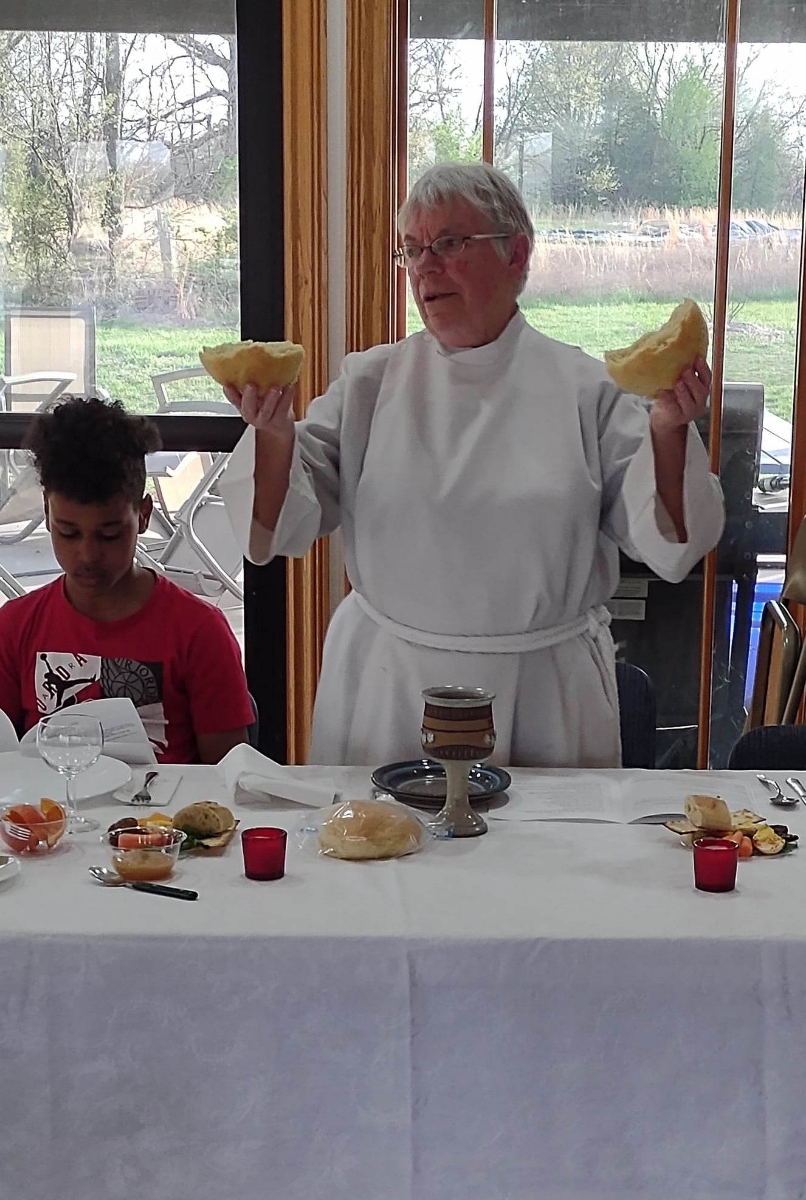Cathy Cox
This year our celebration of Maundy Thursday very nearly coincided with the Jewish festival of Passover.
And although they are not the same, they are both rooted in the great saving event of the Bible: the Exodus.
And this theme is repeated again and again throughout Scripture and in liturgy, and in the hymns and psalms of Judaism and of Christianity. God saves. God delivers. God liberates. God sets people free. Not because anybody deserves it, but because this is how God is.
Christians remember that Judaism is our root – as Paul says, “They are the tree and we are the branches that have been grafted into that tree.” The tree remains. And so do the branches. We continue to draw strength from that story and from Jews who continue to tell God’s deliverance story again and again, who have told it year by year throughout history even under the most horrific circumstances.
It is in the Exodus that Jews – and we – see what kind of God we have: a liberating God. We may not see it in our world, in our political situations. Enslaved people didn’t see it in our own country. Jews didn’t see it in the holocaust; Jews and Christians are not seeing it in Ukraine. And yet – and yet – those people told it about God. And do.
And we Christians understand Jesus as the true Lamb of God, who offered himself once for all – the one who makes a way in the sea – the one who leads people out of every darkness so that the whole world might see and believe that the God of Abraham, the God of Isaac, the God of Jacob, the God of Joseph, the God of Moses and Aaron and Miriam, and the God whom Jesus knew and loved and trusted, the God of Jesus our Lord and Savior, is, and will be forever, the liberating God for all people. We sing it. And yet this God is always surprising us. Unnerving us.
At the last meal Jesus enjoyed with his friends, he did a couple of shocking things. Normally the host at a festive dinner would greet his guests and then a slave would wash the dusty, weary feet of each one.
It wasn’t that kind of meal, it seems. But at some point, Jesus got up and took that servant role himself. He removed his outer garment, tied the towel around his own waist and bent down to wash the feet of his disciples. He was making a statement – and later made it a command to do what he did. This is how I want to be remembered. Do what I do.
You have heard how stunned and resistant Peter was, and how uncomfortable the others were also. It is often difficult to serve each other, but it is also hard to accept being served by someone we see as a leader – our teacher or parent or someone we look up to.
When Jesus responds to Peter’s objection that unless he allows Jesus to serve him, Peter will have “no share” in him- Peter begins to understand – but Peter did not yet know even who he was. And he needed to know in order to “have a share” in Jesus.
Jesus did not kneel before him – or the others, as before slaves, inferiors – but humbly, simply, in respect before his friends, whom he loved as God loved them. That was not easy to accept. It never is easy to be that vulnerable.
Peter and the others must learn that God is not what we so often want God to be – and what we also want to be – one who lords it over others with power.
Dom Helder Camara, who served as bishop in South America for many years, once said, “The problem with human beings is that God is more humble than we are.”
God’s humility is revealed in this – God is a giver, not a taker, who asks nothing of us for himself – but asks only for us to love all those whom he has created. All of them.
Why? Because God is love, and love gives, and forgives…full stop.
And then love gives to the very end – gives himself in food and drink – even to those who will betray him.
Jesus sat at the table and looking at the food, the bread and cup of wine wondered, maybe, “How do I want to be remembered?”
And he picks up that ordinary bread, thanks God for it, breaks it in pieces, gives it to them, and says “This is me – Take it – Eat it – and in that way remember me; Remember: Do this.”
And he lifts the common cup of wine and says, “This is the new covenant in my blood. This is my blood and it will be poured out for you.”
It’s metaphor. It’s image. It’s poetry. And it’s real.
What he was saying was simple: “Whenever you come together, for the rest of time, this is how you will remember me, the one who will give his own body and blood, a sign of God’s everlasting love for you.”
And that is what the foot washing means, too. Jesus emptied himself of all but love – as the hymn says – emptied himself of privilege, of power. Jesus kneels before us, too – and washes our feet. And what Jesus does, God does. And what God does is – God washes our feet, God serves us, God loves us, and God presents fully in Jesus even remains faithful to us all the way into death – and beyond it.

No responses yet